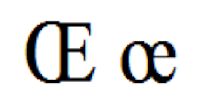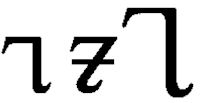12 Letters that Did Not make the American English Alphabet -Page 5

Ethel
Similar to Æ/ash/æsc above, the digraph for OE was once considered to
be a
letter as well, called ethel. It wasn't named after someone's dear, sweet
grandmother, but the Furthark rune Odal, as œ was its equivalent in
transcribing.
It was traditionally used in Latin loan words with a long e sound, such as
subpœna or fœtus. Even federal was once spelled with an ethel.
(Fœderal.) These
days, we've just replaced it with a simple e.

Ond
Long before there were stenographers, a Roman invented a shorthand system
called Tironian notes. One of the most useful symbols and an ancestor to the
ampersand. And yes, it was sometimes drawn in a way that's now a popular
stylistic way of drawing the number 7. When used by English scribes, it became
known as "ond," and they did something very clever with it. If they wanted to
say "bond," they'd write a B and directly follow it with a Tironian ond. For a
modern equivalent, it'd be like if you wanted to say your oatmeal didn't have
much flavor and you wrote that it was "blߣ."
The trend grew popular beyond scribes practicing shorthand and it became common
to see it on official documents and signage, but since it realistically had a
pretty limited usage and could occasionally be confusing, it eventually faded
away.